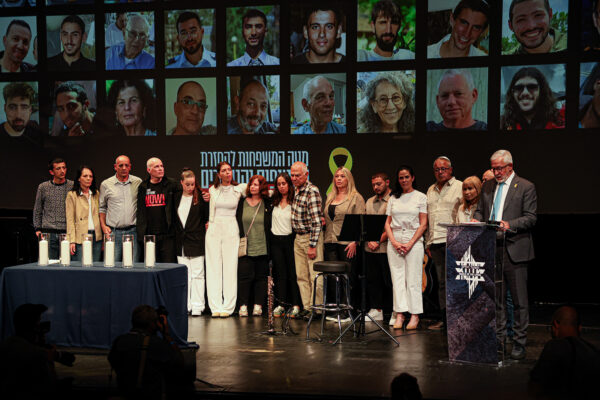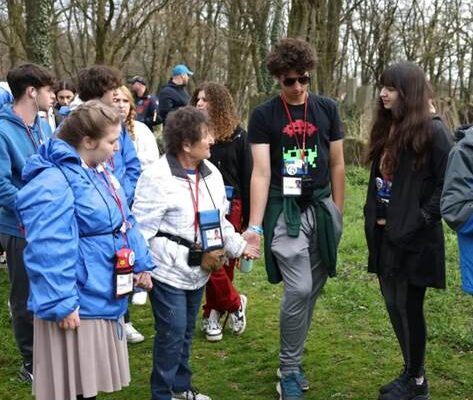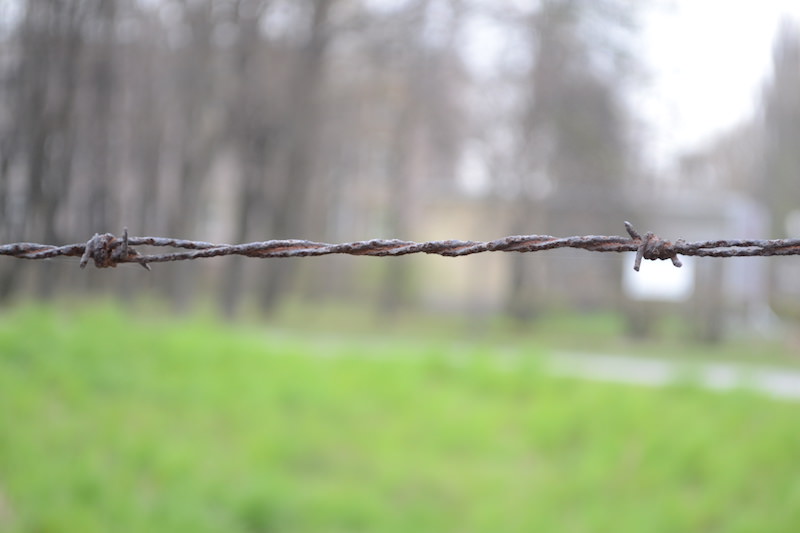
(Scroll down for English version…)
Aún con el equipaje a medio desarmar, la casa revuelta y mi corazón otro tanto, me veo en la situación de satisfacer el oído del otro ante el reiterado pedido de relatar mi viaje.
En estos días me encuentro con palabras escasas pero con múltiples sensaciones. No porque no pueda hacer un relato factual de lo vivido, sino porque justamente este viaje no se describe, a mi humilde entender, con lugares.
Si comento que el primer día fui al cementerio de Lodz, o al campo de exterminio de Majdanek donde vi el mausoleo que contiene las cenizas de las víctimas incineradas. Si menciono la pared arañada de una cámara de gas o las literas abarrotadas de los prisioneros que hoy ya no están. Las latas de Ziklon- B. Los cabellos cortados.Todas estas descripciones no pueden igualar lo que aún no encuentro como transmitir.
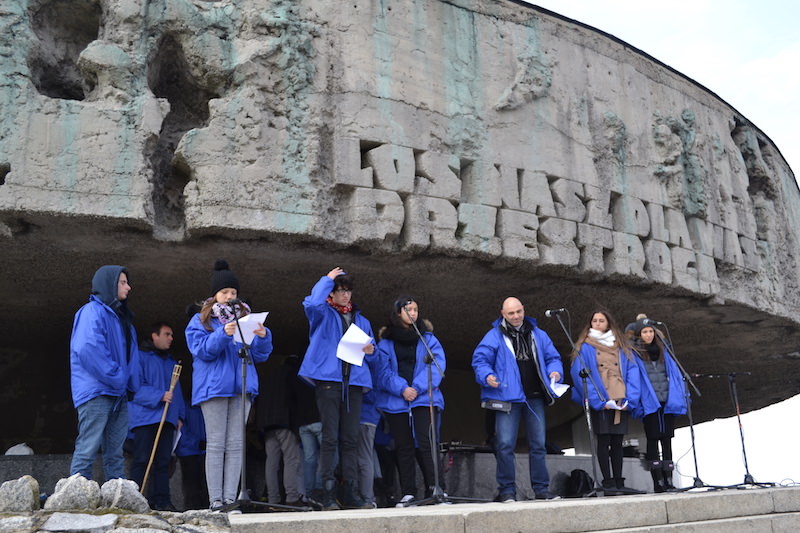
Sin embargo, y con tiempo de quien realmente desee escucharme, podría sentarme a contar sobre el kadish que rezamos en la tumba del bisabuelo de una compañera de viaje apenas bajamos del avión. Compartir la historia de Rutka Laskier en Bedjin y su libro que conseguí para regalar a mi hijo. Transmitir las paredes del orfanato de Janusc Korczak escuchando la imaginaria armónica de Gogol y tantos otros. Compartir el silencio y las lágrimas frente a la barraca 22 en Auschwitz para rendir homenaje a la madre/abuela de la familia entrerriana que también compartió este viaje homenajeando a esa sobreviviente.
El sentir a mi abuelo caminando a mi lado los siete días que duró mi visita a Polonia, con sus manos atrás (como hoy lo hace mi padre). Recordé su malestar y bronca al hablar de ese país y esa guerra que se llevó a sus diez hermanos y de esa manera también llevó cualquier atisbo de comunicación con ellos después del año 39.
El enterarme del Paper Clips Project en Tennessee. La repulsiva historia de Ilse, esposa de K arl Koch, el comandante del campo de concentración de Buchenwald y Majdanek. Esta mujer conocida especialmente por su afición a la piel tatuada de los prisioneros con la cual creaba diferentes objetos.
¿Cómo contar el horror y lo inexplicable? ¿Cómo hablar de las fotos, las canciones que nuestro guía nos hacía escuchar en los campos, la veintena de lecturas que compartimos?
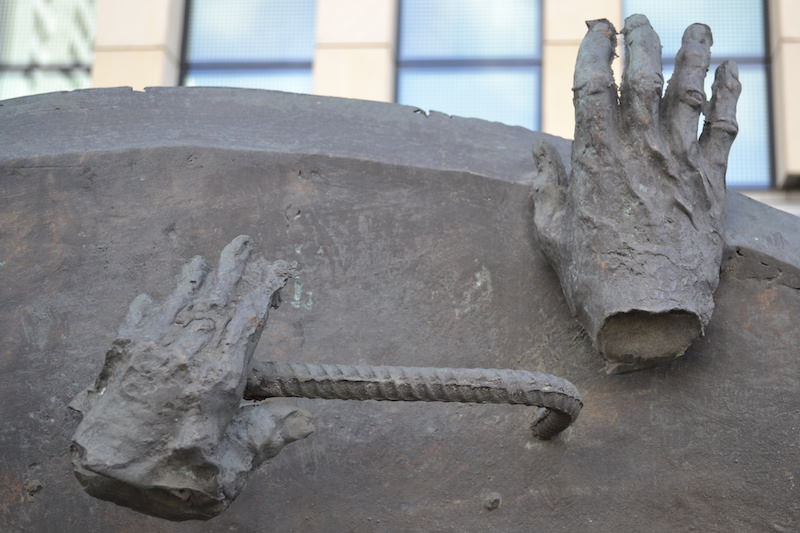
¿Cómo fue posible que el hombre le hiciera esto al hombre? ¿No somos todos iguales? ¿O todos diferentes como las diferentes piedras de Treblinka que hoy simbolizan a cada uno de las víctimas?
Leer las palabras NUNCA MÁS en el memorial de Treblinka. Preguntarme hoy, año 2015, lo mismo que me pregunté en mi ensayo final que logró llevarme a este viaje: ¿Estamos nosotros, seres humanos del siglo XXI, en situación de soportar un capítulo histórico como este en el punto en el que nos encontramos como civilización? Sería acertado sostener que no, pero cabe recordar que las violaciones, la esclavitud, el tráfico de seres humanos y la explotación infantil son algunos métodos de deshumanización modernos que aparentan no despertar tanto interés como el holocausto nazi.
En Majdanek elegimos un zapato y pensamos en la vida que pudo haber andado ese individuo único. Recuerdo el relato de Primo Levi y tantos otros sobrevivientes sobre el cuidado de esa prenda tan importante. El calzado como una necesidad, pero al mismo tiempo como una silenciosa tortura que después de largas horas de marcha ocasionaba numerosas heridas. Los zapatos como mudos testigos me acompañaron en la visita.
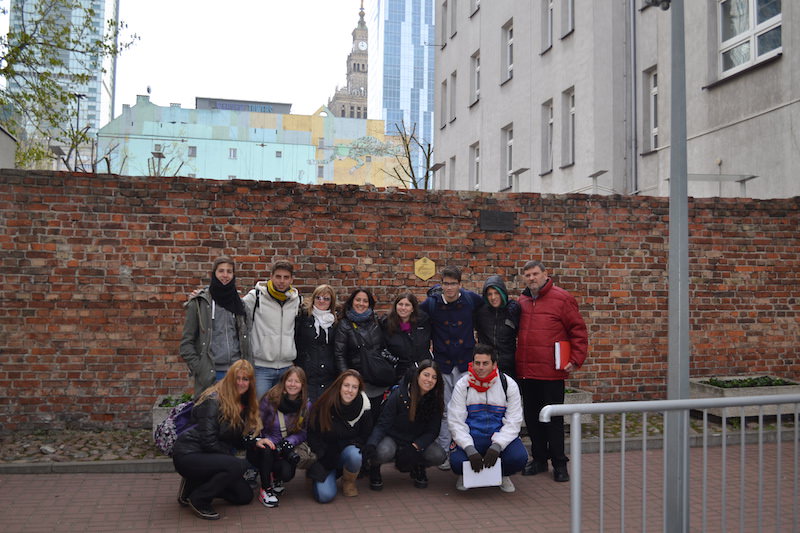
El tema del engaño se repitió una y otra vez a lo largo de mi recorrido. El discurso de bienvenida a los campos diciendo algo así como “Los ubicaremos en barracas donde empezarán una nueva vida. Primero vamos a desinfectarlos y al final del recorrido les espera sopa caliente y pan. Por favor dejen su ropa a un lado y recuerden el número que lleva para que puedan identificarla cuando salgan.”
Definitivamente no es un viaje turístico. Uno espera que al volver pasen cosas y hoy me encuentro preguntándome que me tenía que pasar.
Me encuentro llena de sensaciones y preguntas ¿Qué hago con todo lo que tengo adentro? ¿Cómo lo transmito? ¿Lo transmito aún si no me quieren escuchar?
Si bien la materia que dicto hizo que estudiara un idioma para poder comunicar, estando llena de vocabulario, expresiones, modismos me cuesta retransmitir lo vivido. Es extraño querer contar lo que no se puede contar.
Tal vez tenga que dejar pasar unos días. Así como los sobrevivientes necesitaron su tiempo para poder transmitir, tal vez yo (muy lejos de compararme con ellos) también necesite mi tiempo para compartir todo lo que está adentro mío.
Written by Alejandra Rotman, 2015 Delegation from Argentina
English Translation Using GoogleTranslate:
Even with the half-dismantled luggage, the house revolted and my heart so much, I find myself in the position of satisfying the other’s ear before the repeated request to relate my trip.
In these days I find myself with few words but with multiple sensations. Not because I can not make a factual account of the lived, but because this journey is not described, to my humble understanding, with places.
If I mention that the first day I went to the Lodz cemetery or to the Majdanek extermination camp where I saw the mausoleum containing the ashes of the burned victims. If I mention the scratched wall of a gas chamber or the bunkers crowded with prisoners who are no longer there today. The cans of Ziklon-B. Cut hair.All these descriptions can not match what I still can not find how to convey.
However, and in time of who really wants to listen to me, I could sit and tell about the Kaddish we pray in the tomb of the great-grandfather of a traveling companion as soon as we got off the plane. Share the story of Rutka Laskier in Bedjin and his book that I got to give to my son. Transmit the walls of Janusc Korczak’s orphanage listening to the harmonious imagery of Gogol and so many others. Share the silence and tears in front of barrack 22 in Auschwitz to pay homage to the mother / grandmother of the entrerriana family who also shared this trip honoring that survivor.
Feeling my grandfather walking beside me the seven days that lasted my visit to Poland, with his hands behind (as my father does today). I remembered his discomfort and anger when speaking of that country and that war that took his ten brothers and so also took any hint of communication with them after the year 39.
Find out about the Paper Clips Project in Tennessee. The repulsive story of Ilse, wife of K arl Koch, the commander of the Buchenwald and Majdanek concentration camp. This woman known especially for her fondness for the tattooed skin of the prisoners with which she created different objects.
How to tell the horror and the inexplicable? How to talk about the photos, the songs that our guide made us hear in the fields, the twenty readings we share?
How could man do this to man? Are not we all the same? Or all different as the different stones of Treblinka that today symbolize each of the victims?
Read the words NEVER AGAIN at the Treblinka memorial. Ask me today, year 2015, the same as I asked myself in my final essay that managed to take me to this journey: Are we, human beings of the 21st century, able to endure a historical chapter like this at the point where we are as civilization? It would be correct to argue that it is not, but it should be remembered that rape, slavery, human trafficking and child exploitation are some modern dehumanization methods that do not appear to arouse as much interest as the Nazi holocaust.
In Majdanek we chose a shoe and we thought about the life that could have walked that unique individual. I remember the story of Primo Levi and many other survivors about the care of that important garment. The footwear as a necessity, but at the same time like a silent torture that after long hours of march caused numerous wounds. The shoes as dumb witnesses accompanied me on the visit.
The theme of deception was repeated over and over again along my route. The welcome speech to the fields saying something like “We will locate them in barracks where they will start a new life. First we are going to disinfect them and at the end of the tour awaits hot soup and bread. Please put your clothes aside and remember the number you have so that they can identify you when they leave. “
Definitely not a tourist trip. One hopes that things will happen again and today I find myself wondering what had to happen to me.
I am full of sensations and questions What do I do with everything I have inside? How do I transmit it? Do I transmit it even if you do not want to listen?
Although the subject that I dictate made me study a language to be able to communicate, being full of vocabulary, expressions, idioms I have difficulty in relaying what I have experienced. It is strange to want to tell what can not be told.
Maybe I have to let a few days go by. Just as the survivors needed their time to convey, maybe I (far from comparing myself to them) also need my time to share everything that is inside of me.
Written by Alejandra Rotman, 2015 Delegation from Argentina
